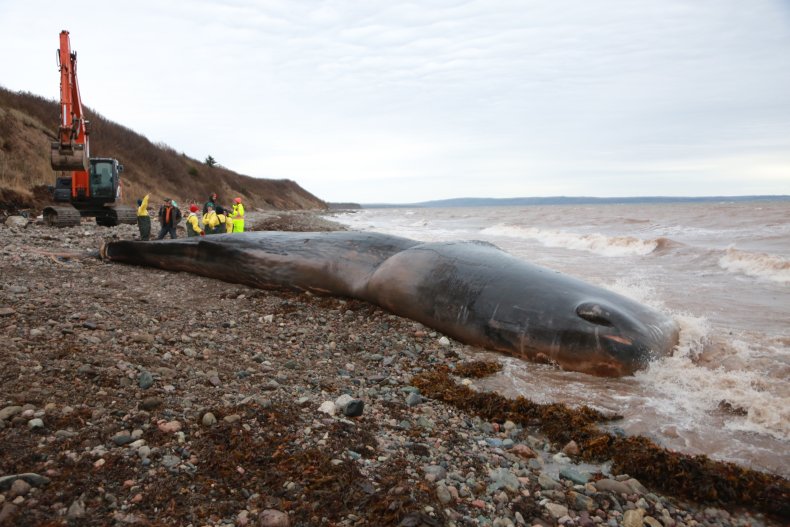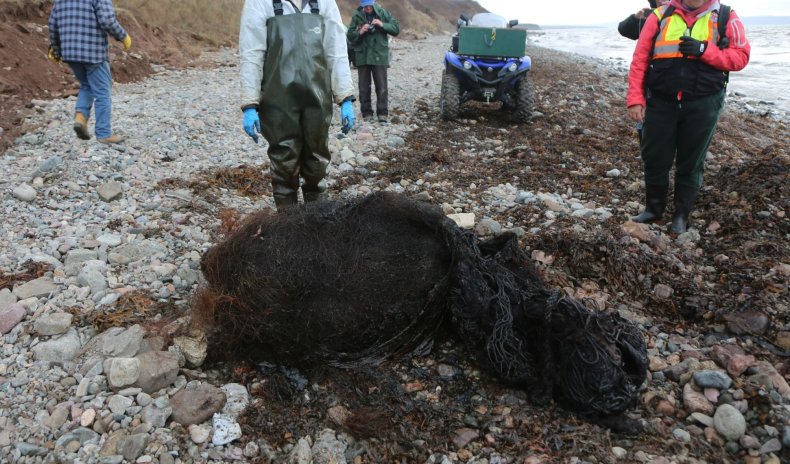An emaciated sperm whale that washed up in Canada had 330 pounds of fishing gear in its stomach when it died, scientists have found.
The sperm whale was alive when it washed ashore on Cape Breton Island on November 9. Teams from the Marine Animal Response Society (MARS), the Canadian Wildlife Health Cooperative-Atlantic Veterinary College and the Nova Scotia Department of Natural Resources and Renewables arrived on the scene to find the whale extremely underweight. It died during the night, MARS said in a statement posted to Facebook.
A necropsy of the animal has now found that there were 330 pounds of fishing gear in its stomach, which led to it slowly starving to death.
Sperm whales can be found worldwide. They are a vulnerable species and face a number of threats, including fishing gear entanglement or injury and noise pollution.

Marine Animal Response Society
Marine mammals strand ashore for a number of reasons. More often than not they are found severely unwell or injured, meaning they do not have the strength to swim away from the shore.
Tonya Wimmer, Executive Director of MARS told Newsweek: “Ingestion of debris in the oceans—including fishing gear and plastics—is a serious issue for marine life around the world. The deaths of sperm whales and many other species have been investigated and attributed to ingestion of debris. In the Canadian Maritime Provinces, we have previously had animals with plastics and other debris found in their stomach, but never anything to this degree before.”
Sperm whales usually weigh around 90,000 pounds but is not clear how much the sperm whale in Canada weighed when it washed up. The species’ stomach is about 4 feet long and 3 foot wide.
Teams do not yet know whether the fishing gear came from Canada or another country. It is also not clear where or when the gear was ingested.
“Fishing gear is known to be a threat to many species, both from ingestion and also when the animal is entangled in gear externally. For some critically endangered [species], entanglements in fishing gear pose a serious issue for their recovery. That said, entanglement in fishing gear is not the only threat to species in the oceans, Wimmer said.
These include ingestion of marine debris, strikes by vessels, pollution and the impact from noise in the oceans.
Nonetheless, fishing gear poses a huge threat to marine species, whether it be from ingestion or injury. It can sometimes entangle around whales bodies, meaning they are unable to eat or swim effectively. An estimated 300,000 whales, dolphins and porpoises die every year globally after being injured by fishing gear, a 2021 study the University of St Andrews, Fife reported.

Marine Animal Response Society
A critically endangered North Atlantic Right Whale named Snow Cone became well-known after being entangled in huge amounts of fishing line. Scientists last spotted her in September and determined her death was all but certain.
“There are two key things which can be done. [We can] clean up the debris that is currently in our environment, both in the ocean and on land,” Wimmer said. “There are many ‘ghost gear’ and shoreline clean up programs around the world which have been aiming to tackle this issue because it is a major conservation concern for marine life, as well as humans given we eat animals in the ocean.”
“Going forward, [we can] ensure debris does not end up in the oceans. This involves the overall reduction in use of plastics…proper disposal and recycling of any materials being used, including fishing gear, and the collection of lost gear when fishers note it has been lost at sea,” she said. “And these measures are things that everyone should be doing, including those who don’t live near the coasts as debris in the oceans can get there in many ways via air and water.”
MARS recently worked to remove several great white sharks that were found washed up off the coast of Nova Scotia. While strandings for marine mammals are common, it is rare for sharks.
